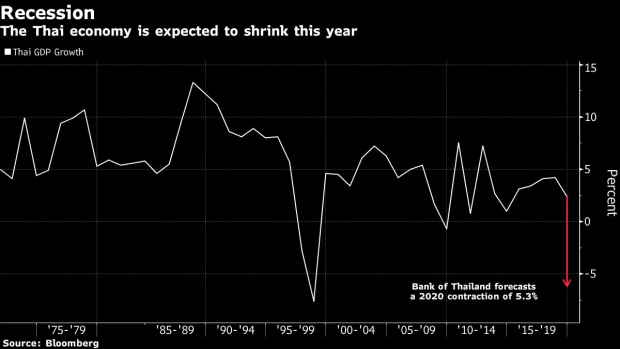Apr 9, 2020
Virus Gives Embattled Thai Premier Chance to Consolidate Power
, Bloomberg News

(Bloomberg) -- Thailand’s coup chief-turned-premier Prayuth Chan-Ocha has regained sweeping emergency powers to fight the coronavirus outbreak, pinning his political fate to the response he crafts as discontent grows.
This week he confirmed a $58 billion stimulus package to mitigate the economic fallout, after earlier efforts were described as insufficient for a country heading into recession. Even before the virus crisis, Prayuth and his establishment backers faced escalating protests from critics who dispute the fairness of the election last year that led to his return as leader.
“There’s a lot of pent up frustration toward current rulers,” said Paul Chambers, a politics expert at Thailand’s Naresuan University. Prayuth could trumpet stable leadership if he controls the situation, or suffer insurmountable damage if infections and economic losses spiral, he said.
Prayuth has imposed a state of emergency through April under which mass gatherings are banned, in the hope that social distancing will help control a surge in infections to more than 2,400 cases. The lockdown gives the former army chief a window to burnish his leadership credentials if he can defeat the outbreak and alleviate its social toll.
Emergency Decree
The task is daunting. While key Southeast Asian economies are set to shrink or slow this year, the outlook for Thailand is among the most challenging. The Bank of Thailand forecasts the deepest contraction since the 1990s as tourism and exports slump. The nation is the only one in the region to experience several increases in poverty since 2000, according to the World Bank.
Under the emergency decree, Thailand’s borders are shut to foreigners and social gatherings are banned. Prayuth has power over government ministries, and has made the military the primary security arm for the recently set up Covid-19 response center.
“It’s been three months since the first case was detected, and only now have we started seeing tough measures,” said Saratsanun Unnopporn, deputy spokeswoman for Pheu Thai, the country’s biggest opposition party. “Different ministries can’t seem to cooperate under normal circumstances, and when facing a crisis, that issue became clearer.”
Masks, Testing Kits
Government spokeswoman Narumon Pinyosinwat said the fight against Covid-19 will be smoother with Prayuth directly in charge of the response. She added that the premier is working to resolve pending issues, such as the availability of face masks and testing kits.
Prayuth ruled with absolute executive authority after seizing power in a coup in 2014. He returned as premier last year under electoral rules crafted during the junta’s tenure. His ruling coalition’s four-year term lasts until 2023.
Much now depends on the path of the outbreak and the government’s steps to help struggling households.
About 24 million people -- more than one-third of the population -- registered for cash handouts designed to soften the blow of the coronavirus outbreak. Most will miss out as the policy is currently designed for at most 9 million people not already covered under the existing social safety net.
Cash Handouts
The cash handouts are just one element of the 1.9 trillion baht ($58 billion) stimulus package to assist blue-collar workers, farmers and small to medium-sized firms. The plan also allocates funds to help stabilize financial markets.
“Covid-19 is now our national agenda,” Prayuth said April 7. “I’ll be stringent about how we spend, and that the spending is done most effectively.”
Overall, Thailand has committed “massive stimulus” amounting to 11.4% of gross domestic product to combat the impact of the disease, according to United Overseas Bank Ltd.
“The next few weeks will be very crucial,” said Punchada Sirivunnabood, an associate professor in politics at Mahidol University. “If the blow is minimized, it could boost confidence and the government’s popularity. If it got out of control, middle-class support would diminish, and that means trouble in the next election.”
©2020 Bloomberg L.P.







